情态动词 Model Verbs
情态动词(model
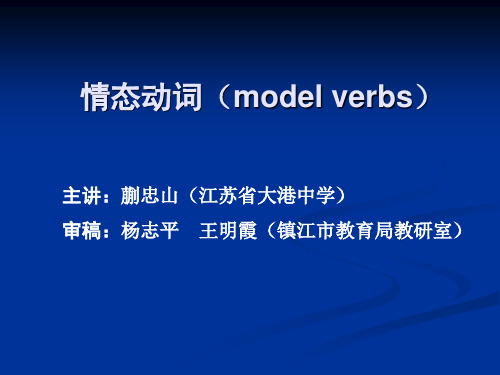
--- May I listen to music while doing homework? --- No, you mustn’t. 做作业时我能听音乐吗? 不,不行。
3)在疑问句中must可用来征询对方的愿望, 表示“偏要、偏偏”。 Why must you find another job while you have got one? 你已有一份工作,为什么偏偏再找一份? John, look at the time. _____ you play the piano at such a late hour? A. Must B. Can C. May D. Need
to type a report.
--- You ____ have my computer if you don’t take care of it. A. shan’t C. needn’t B. might not D. shouldn’t
8. should
1)表示义务、职责等,往往表达说话者的观 点。 I think today’s children should learn to respect their elders. 我认为现在的孩子应当好好学习尊敬长辈。 I often see lights in that empty house. Do you think I ______report it to the police? A. should B. may C. will D. can
情态动词,特殊疑问句,一般疑问句
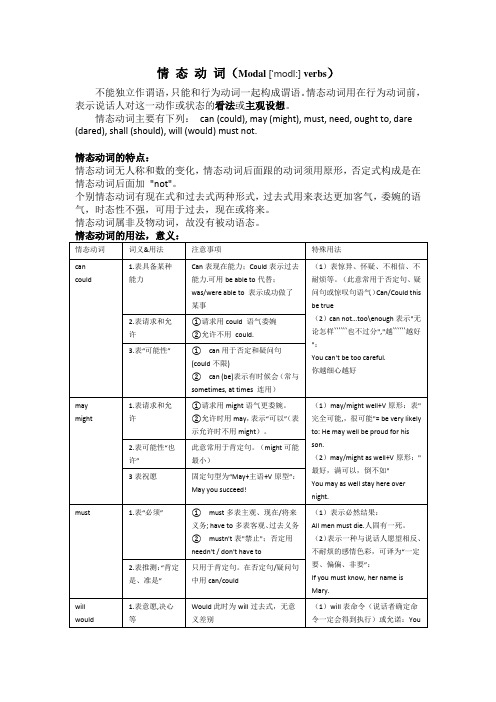
情态动词(Modal [‘modl:] verbs)不能独立作谓语,只能和行为动词一起构成谓语。
情态动词用在行为动词前,表示说话人对这一动作或状态的看法或主观设想。
情态动词主要有下列:can (could), may (might), must, need, ought to, dare (dared), shall (should), will (would) must not.情态动词的特点:情态动词无人称和数的变化,情态动词后面跟的动词须用原形,否定式构成是在情态动词后面加"not"。
个别情态动词有现在式和过去式两种形式,过去式用来表达更加客气,委婉的语气,时态性不强,可用于过去,现在或将来。
情态动词属非及物动词,故没有被动语态。
一般疑问句General ['dʒenrəl] Questions1.基本结构:①谓语动词是助动词(do, have和be)、情态动词时,只要直接把这些词置于句首,句末改成问号。
★be + 主语+ 其它部分★情态动词+ 主语+ 动词原形+ 其它部分★肯定回答用“Yes,主语+be\情态动词.”,否定回答用“No,主语+be\情态动词+not.”。
②谓语动词是行为动词时,必须在句首加上助动词Do、Does、Did,句子中谓语动词必须用原形。
★助动词+ 主语+ 动词原形+ 其它Do your parents like English Yes,they do. / No,they don’t③注意:在把肯定句改成否定句或一般疑问句的时候, already要改成yet,some、something、somebody等分别改成any、anything、anybody等。
在改成否定句的时候注意把too改成either, both改成neither, all改成none等.把第一人称I、we改成第二人称you。
Are you from Japan﹖Yes, I am./ No, I'm not.Is her sister doing her homework now﹖Yes, she is./ No, she isn't.Does he work in a bank﹖Yes, he does./ No, he doesn't.2.将陈述句变为一般疑问句①含be动词或情态动词的句子(秘诀:一调二改三问号)一调:即把句中的be或情态动词调到主语前;二改:改换主语称谓,即将句中的主语I\my \mines\we\our\ours等第一人称分别改为相应的第二人称you\your\ yours等;三问号:句末的句号改为问号。
情态动词Model Verbs
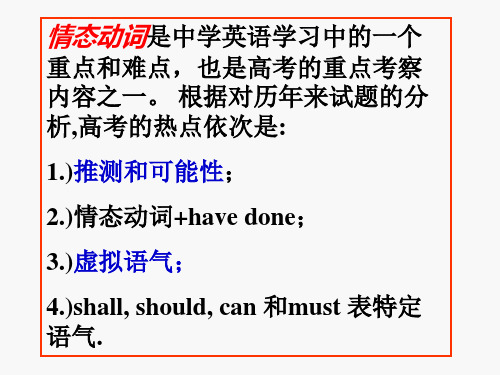
重点和难点, 重点和难点,也是高考的重点考察 内容之一。 内容之一。 根据对历年来试题的分 高考的热点依次是: 析,高考的热点依次是 高考的热点依次是 推测和可能性; 1.)推测和可能性; 推测和可能性 2.)情态动词 情态动词+have done; 情态动词 ; 3.)虚拟语气; 虚拟语气; 虚拟语气 4.)shall, should, can 和must 表特定 语气. 语气
• ⑤(2008·浙江)You ________ be hungry already—you had lunch only two hours ago! • A.wouldn't B.can't • C.mustn't D.needn't • 答案:B
• ⑥(北京朝阳区)—Will Helen get disappointed if I tell her she failed? • —I think she ________. • A.may • C.should • 答案:A B.has to D.need
• (2007·陕西)I told your friend how to get to the hotel,but perhaps I________have driven her there. • A.could B.must • C.might D.should
• (2008·重庆)—I can't find my purse anywhere. • —You ________ have lost it while shopping. • A.may B.can • C.should D.would • 答案:A
• 这样考过 • (成都检测)I can't find Mr.Li anywhere in the office building.Where ________ he have gone? • A.must B.could • C.should D.would
modal verb(情态动词)
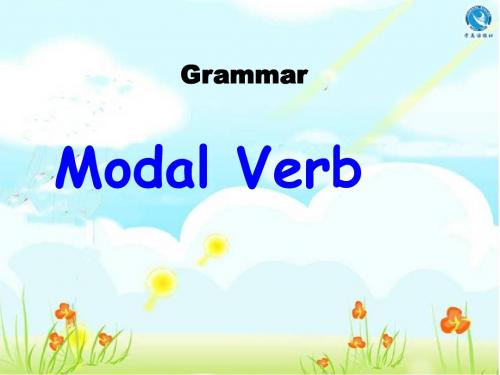
Modal Verb
什么是情态动词? (Modal Verbs) 情态动词表示说话人的某种 感情或语气,对某一动作 或状态的某种态度。 表示“需要、可以、 必须、应当”等。
情态动词的语法特征
1. 情态动词不能单独做谓语,除ought 和have外,后面只能接不带to的不定式。 2. 情态动词没有人称,数的变化,但有 些情态动词,如can, will也有一般式 和过去式的变化。
may 常用来表示: A. 表示请求、允许: B. 表示说话人的猜测: “也许” “可 能”: 通常只用于肯定句和否定句中。
C. 表示祝愿; 但语气较正式: might 的用法有: 多在间接引语中表示过去的可能和允 许。如: She said that he might take her bike. 她说他可以拿她的自行车去用。
表示现在的许可,语气比may 较委婉,
一般用于疑问句(包括间接疑问句),
不可用于肯定句或者否定句。
如: Might I have a word with you?
我可以和你说句话吗?
will和would
1. will是助动词还是情态动词?
will用于构成将来时是助动词。
用于表示“意志”“决心”“请求”是
2. 表示否定的情态动词的用法:
部分情态动词的否定式是情态动词中的 考点之一。 mustn’t 不准; 禁止 needn’t 没必要 ( = don’t have to ) can’t 不能; 不可能 may not 不可以; 可能不 shouldn’t 不应该 ( = ought not to )
表示主语的义务或责任: You should take care of your sister. 你应当去照顾你妹妹。 或指出一个正确、明智的动作: They shouldn't allow parking here; the street is too narrow. 这儿不该允许停车;马路太窄了。
Model Verbs语法-情态动词
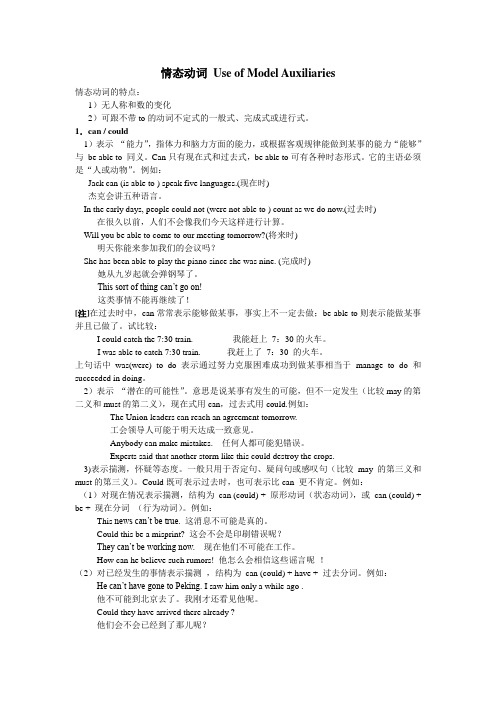
情态动词Use of Model Auxiliaries情态动词的特点:1)无人称和数的变化2)可跟不带to的动词不定式的一般式、完成式或进行式。
1.can / could1)表示“能力”,指体力和脑力方面的能力,或根据客观规律能做到某事的能力“能够”与be able to 同义。
Can只有现在式和过去式,be able to可有各种时态形式。
它的主语必须是“人或动物”。
例如:Jack can (is able to ) speak five languages.(现在时)杰克会讲五种语言。
In the early days, people could not (were not able to ) count as we do now.(过去时) 在很久以前,人们不会像我们今天这样进行计算。
Will you be able to come to our meeting tomorrow?(将来时)明天你能来参加我们的会议吗?She has been able to play the piano since she was nine. (完成时)她从九岁起就会弹钢琴了。
This sort of thing can‟t go on!这类事情不能再继续了![注]在过去时中,can常常表示能够做某事,事实上不一定去做;be able to则表示能做某事并且已做了。
试比较:I could catch the 7:30 train. 我能赶上7:30的火车。
I was able to catch 7:30 train. 我赶上了7:30 的火车。
上句话中was(were) to do表示通过努力克服困难成功到做某事相当于manage to do和succeeded in doing。
2)表示“潜在的可能性”。
意思是说某事有发生的可能,但不一定发生(比较may的第二义和must的第二义),现在式用can,过去式用could.例如:The Union leaders can reach an agreement tomorrow.工会领导人可能于明天达成一致意见。
Model Verb
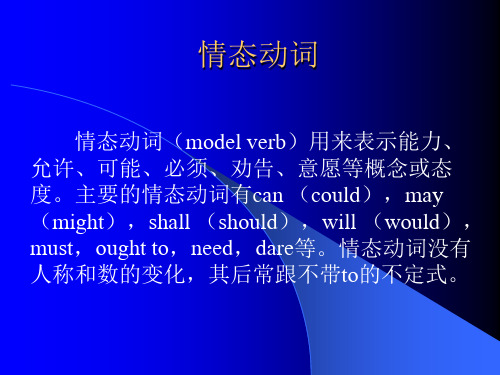
2. 情态动词的特殊用法
(1) 情态动词+不定式完成时 1) can/could, may/might, must + have + 动词的过去分词 用于肯定句:表示对过去事件的主观判断,推测过去某动作 “可能”、“也许”、“一定”已发生。 Tom could have taken the dictionary. I saw him using it last Sunday. I can’t find my sunglasses. I may/might have left them at the restaurant yesterday. You screamed in your sleep last night. You must have had a terrible dream. 用于否定句:表示推测过去某动作“可能”、“也许”、 “一定”没有发生。 She couldn't have finished her work so soon. She may not have seen you. Dad mustn't have washed the dishes last night.
will/would 表示动作者愿意。 I will lend you the book if you need it. I won’t do it again. I have been trying to open the door, but the key won’t turn. “will you/would you…” 在下列句中表示客气的建 议、询问。 Will you please have a drink? Would you please pass me the salt? Would you like a cup of tea? Would you mind if I opened the window? Would you mind opening the window? Would you mind my opening the window? would 还表示过去的习惯。等于used to On Sundays he would get up early and go fishing.
情态动词在英语中的用法总结

情态动词在英语中的用法总结1. 什么是情态动词情态动词(Modal Verbs)是一类特殊的助动词,在句子中常与主要动词一起使用,用来表示说话者对某种动作或状态的态度、能力、推测等。
2. 情态动词的列表以下是常用的情态动词列表:- Can(能力、许可)- Could(能力、过去能力、礼貌的请求)- May(许可、可能性)- Might(可能性、推测)- Must(必须、推测)- Shall(意愿、建议、命令)- Should(应该、建议)- Will(意愿、承诺)- Would(愿意、过去惯性动作、礼貌的请求)3. 情态动词的用法3.1 表示能力和许可情态动词 can 和 could 用来表示能力,may 和 might 用来表示许可。
例如:- I can swim.(我会游泳。
)- Could you help me with this?(你可以帮我一下吗?)- May I go to the restroom?(我可以去洗手间吗?)3.2 表示可能性和推测情态动词may、might 和could 用来表示可能性和推测。
例如:- It may rain tomorrow.(可能明天会下雨。
)- He might be late for the meeting.(他可能会迟到会议。
)- Could it be true?(这可能是真的吗?)3.3 表示必须和推测情态动词 must 表示必须,而 may 和 might 用来表示推测。
例如:- You must finish your homework.(你必须完成作业。
)- She may have forgotten the appointment.(她可能忘记了约会。
)- It might rain later.(天后可能下雨。
)3.4 表示意愿和建议情态动词 shall、should、will 和 would 用来表示意愿和建议。
例如:- Shall we go to the movies?(我们去看电影好吗?)- You should take a break.(你应该休息一下。
Modal Verbs1

Modal Verbs (情态动词)一、情态动词:can, could, may, might, mist, need, ought to, dare, 有时shall, should, will,would 在一定场合下也算作情态动词。
二、情态动词的用法:1.情态动词后接动词原形表示现在的情况e.g. We must work hard at our lessons.We ought to help each other in our study.2.情态动词后接动词的完成形式构成谓语表示过去的情况,意为:“应当已经…,“想必已经…等1). can / could /may / might /must + have done表示对过去事件的推论,意为;“可能”“也许”“一定”已经做了某事。
e.g. The ground is wet. It must have rainedlast night .2). should / ought to + have done 表示本应该做而没有做。
e.g. I should have bought that fashion shoesyesterday, but I didn’t .Your grandfather died. He ought to haveenjoyed his leisure time.3). should not / ought not to + have done 表示本不该做而做了。
e.g. The man is very clever. He ought not tohave done such a stupid thing.4). needn’ t + have done表示做了不必做的事,意为:“本不必”e.g. You needn’t have bought that coat, we canmake one for you.You needn’t have seen me, I will go backthis afternoon.Exercises (情态动词)1. You are late for work again. You ____have been here an hour earlier.A. shouldB. mayC. mustD. could2. That’ s all right. I can deal with it. You ____ with me.A. don’t need goB. need not go toC. need not goD. need go3. To travel from American to England you must have a passport, but to travel from England to Scotland you ____ .A. mustn’tB. can’tC. don’t haveD. needn’t have4. The house is dark. The Greens ____ to bed.A. must have goneB. should goC. should have goneD. must go5. His English composition is not too good, she ___ itherself.A. can’t have writtenB. won’t have writtenC. mustn’t have writtenD. should have written6. My purse was not found . I ____when I was in a train.A. must dropB. had droppedC. should have droppedD. must have dropped7. They didn’t seem surprised when I told them the news. They ___ about it.A. may have knownB. will have knownC. need have knownD. should have known8. The room is in a terrible mess, it ___ cleaned.A. can’t have beenB. shouldn’t have beenC. mustn’t have beenD. wouldn’t have been9. You ____ the job yesterday. We have a secretaryTo do that kind of thing.A. needn’t have doneB. mustn’t have doneC. should have doneD. can’t have done10. You ___her yesterday. She has been out for two days.A. needn’t have seenB. must have seenC. might have seenD. can’t have seen11. He thought it ___ last night.A. couldn’t rainB. couldn’t have rainedC. mustn’t have rainedD. needn’t have rained12. He ___ at the meeting, but I didn’t notice him there.A. must have beenB. would have beenC. may have beenD. must be13. He hasn’t come yet, he ___ an accident.A. must have beenB. would have beenC. may have beenD. must be14. He ___ be Canadian because he has got a Japanesepassport.A. can’tB. isn’t ableC. mustn’tD. doesn’t15. I was really anxious about you . You __ homewithout a word .A. mustn’t leaveB. shouldn’t have leftC. couldn’t have leftD. needn’t leave16. I am not feeling well in the stomach. I ___ so muchfried chicken just now.A. shouldn’t eatB. mustn’t have eatenC. shouldn’t have eatenD. mustn’t eat17. My English-Chinese dictionary has disappeared.Who ___ have taken it?A. shouldB. mustC. couldD. would18. Mr. White ___at 8:30 for the meeting, but he didn’tShow up.A. should have arrivedB. should arriveC. should have had arrivedD. should be arriving19. __ Tom graduated from college at a very young age.__Oh, he ___have been a very smart boy then.A. couldB. shouldC. mightD. must20. __I will tell Mary about her new job tomorrow.__ You ____her last week.A. ought to tellB. would have toldC. must tellD. should have told。
情态动词(Modal Verbs)

另一类意思涉及必须做某事或允许做某 事之类的意思:情态动词可以用来表示 某人必须做某事、某人能做某事,如果 某事发生(或不发生)就会好一些,或 者某事是许可或禁止的。
一、表示有把握的程度 情态动词可以表达对于某一事实 或事件有把握的各种不同程度。
a完全有把握(肯定的或否定的)
1. shall用于第一人称: I/We shall be away tomorrow. I shan’t be late on Wednesday. 2. will 用于各种人称: That’s the phone. That’ll be Tony. Things will be right. It won’t rain this evening. You’ll be right.
情态动词 modal verbs
情态动词 情态动词 的 特点
1)有特定的词义 ) 2)没有人称和数的变化 ) 3)其后加动词原形(do), have done ,be doing. )其后加动词原形
易混易错用的情态动词
1。区别must / have to 。区别 Must表示人在主观上认为的必要、必须、一定要 表示人在主观上认为的必要、 表示人在主观上认为的必要 必须、 Have to表示受环境或习惯支配的客观必要 表示受环境或习惯支配的客观必要 不得不” 能用于更多时态。 “不得不”,能用于更多时态。 1)Soldiers ________obey officers. must have to 2)It’s raining outside.We_________stay at home. 3As he had broken his leg, he had to , ______lie in bed.
can’t, couldn’t
人教版高中英语必修三单元一Book3 Unit1 Modal Verbs情态动词

2. may 和 might
1) 表示许可或请求 permission/request may否定式可用may not,但表示“不可以”时 常用must not(mustn't) 代替may not. 用might提问,用may回答。might比may委婉。 - May/Might I go with my friends to the harvest festival? -Yes, you may. -No, you may not./ No, you mustn't./ No, you'd better not. 2)表示可能性possibility 语气强弱 may › might
人教版高中英语必修三单元一 Book3 Unit1 Modal Verbs情态动
词
定义: 情态动词表示说话人对某一动作或 状态的态度。
特点: 1. 情态动词不能单独作谓语, 必须和动词原形连用。 She can play basketball.
2. 情态动词没有人称和数的变化。
一些情态动词的过去式: can - could may - might shall - should will - would have to - had to
5. will 和 would
1)表示“意愿”,“允诺”,可用于所有人称。 I will tell you all about that. He won't go with us. 2)表示请求,用于第二人称。 用would提问,用will回答。would比will委婉。 Will you like a cup of tea? -Would you like a cup of tea? -Yes, I will./Yes, I'd love to. -No, thanks. 3)表示习惯动作或某种倾向,用于第三人称。 Fish will die out of water.
情态动词语法
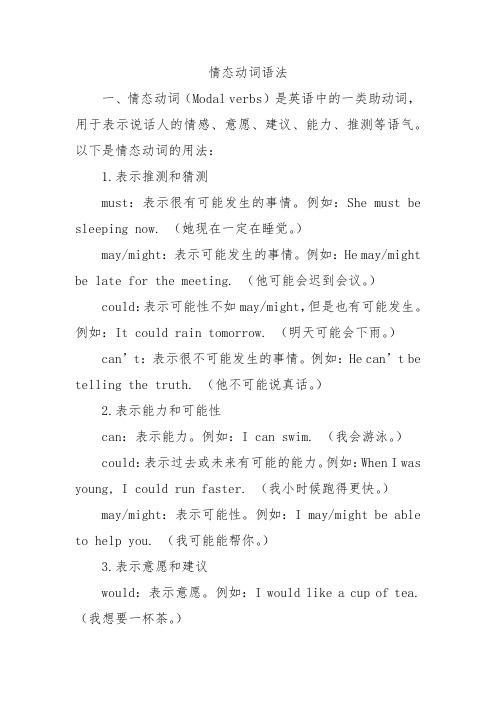
情态动词语法一、情态动词(Modal verbs)是英语中的一类助动词,用于表示说话人的情感、意愿、建议、能力、推测等语气。
以下是情态动词的用法:1.表示推测和猜测must:表示很有可能发生的事情。
例如:She must be sleeping now. (她现在一定在睡觉。
)may/might:表示可能发生的事情。
例如:He may/might be late for the meeting. (他可能会迟到会议。
)could:表示可能性不如may/might,但是也有可能发生。
例如:It could rain tomorrow. (明天可能会下雨。
)can’t:表示很不可能发生的事情。
例如:He can’t be telling the truth. (他不可能说真话。
)2.表示能力和可能性can:表示能力。
例如:I can swim. (我会游泳。
)could:表示过去或未来有可能的能力。
例如:When I was young, I could run faster. (我小时候跑得更快。
)may/might:表示可能性。
例如:I may/might be able to help you. (我可能能帮你。
)3.表示意愿和建议would:表示意愿。
例如:I would like a cup of tea. (我想要一杯茶。
)should:表示应该做的事情。
例如:You should go to see a doctor if you feel sick. (如果你感到不舒服,你应该去看医生。
)4.表示命令和建议must:表示强制性的命令或规定。
例如:You must wear a helmet when riding a bike. (骑自行车时必须戴头盔。
)should:表示建议或推荐。
例如:You should study hard for the exam. (你应该努力学习考试。
Model Verb
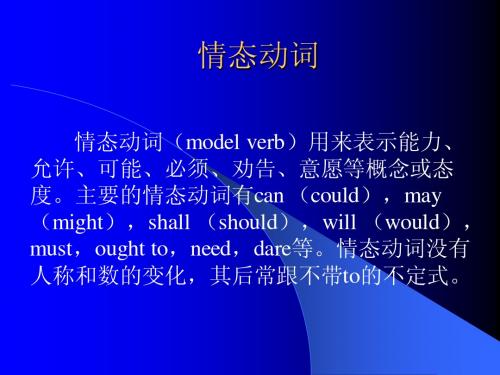
(5)表示责任和劝告: should, ought to, must, had better )表示责任和劝告: 1) 用should和ought to 表示责任和劝告,后者的 语气重些 You should/ought to do as you are told. Such things shouldn't/ought not to be allowed. 2) 有时也用must 表示责任和劝告。 must You must see the movie. It’s wonderful. 3) 口语中也常用had better 表示劝告,意为“最 好做/不做某事”。 You had better take care of yourself. You’d better not make a mistake next time. Hadn’t you better see who is at the door?
2)
(9)表示勇敢:dare (9)表示勇敢:dare
dare 表示“敢于”,用于否定句、疑问句或条 件句。 He dare not try. How dare you open the letter? If you dare say a word, I’ll strike you down. dare 还常用作实义动词。 He dare to surf in heavy waters. daresay 或 dare say,表示probably, I suppose. I dare say he will come home late.
will/would 表示动作者愿意。 I will lend you the book if you need it. I won’t do it again. I have been trying to open the door, but the key won’t turn. “will you/would you…” 在下列句中表示客气的建 议、询问。 Will you please have a drink? Would you please pass me the salt? Would you like a cup of tea? Would you mind if I opened the window? Would you mind opening the window? Would you mind my opening the window? would 还表示过去的习惯。等于used to On Sundays he would get up early and go fishing.
modal verbs讲解

情态动词modal verbs情态动词表示说话人的某种感情或语气,对某一动作或状态的某种态度,表示“需要”“可以”“应该”等意义。
情态动词有以下特征:1. 不能单独作谓语,除ought to 和used to 以外,后面只能接不带to 的不定式。
2. 没有人称和数的变化。
但有些情态动词,如can, will, dare有一般现在时和过去时的变化。
3. 情态动词的“时态”形式并不是区别时间的主要标志,很多情况下,情态动词的现在时形式和过去时形式都可用来表示现在时间、过去时间或将来时间。
PartⅠ1 . 表示“能力”与be able to 的区别:can 只有现在和过去时态,强调能力;be able to有各种时态,表示“一时”, “某一次具体”的能力,强调结果.was / were able to : “(过去)成功地做到…”Mary can play the piano .She has been able to play it since she was 5.Yesterday I was able to get home before the heavy rain.A big fire broke out in the hotel last night. Fortunately, all people were able to escape.相当于managed to do sth. /succeeded in doing sth.2.表示“许可”、“请求”(表示请求时,口语中常用could 代替can,使语气更加婉转,但回答要用can。
)--Could I use your bike? --Yes, you can.3.表示“理论上或一时的可能”(主要用于肯定的陈述句)Anybody can make mistakes. It can be dangerous to go traveling without a mate.Wuhan can be very hot in summer.I like kids, but they can be very naughty sometimes.4. 表示推测(主要用于否定句和疑问句) (此时,could表示可能性比can 低,不表示过去时)He can't be at home, for the lights are off. Can the news be true ?You couldn’t have seen me in the museum yesterday, because I was sleeping at home all day.在这种用法中,can / could也可以表示惊讶、怀疑、不相信的态度。
情态动词(Model Verbs)讲解
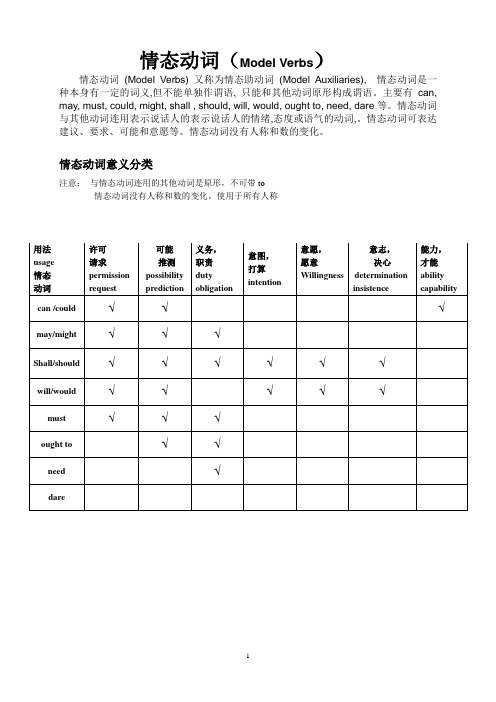
情态动词(Model Verbs)情态动词(Model Verbs) 又称为情态助动词(Model Auxiliaries), 情态动词是一种本身有一定的词义,但不能单独作谓语, 只能和其他动词原形构成谓语。
主要有can, may, must, could, might, shall , should, will, would, ought to, need, dare等。
情态动词与其他动词连用表示说话人的表示说话人的情绪,态度或语气的动词,。
情态动词可表达建议、要求、可能和意愿等。
情态动词没有人称和数的变化。
情态动词意义分类注意:与情态动词连用的其他动词是原形,不可带to情态动词没有人称和数的变化,使用于所有人称一.can 和could 的用法:1.表示:能力ability and capacity 意“能够”表示人或动物的内在能力即有某种知识或者技能而能够做某事。
有时可以和be ableto互换。
He can swim across the river ( He is able to swim across the river)Can she speak English ? ( Is she able to ----)He hurt his foot and couldn't (wasn't able to) play football. 他脚受了伤,所以他不能踢足球了。
can 和be able to 的区别:(1)表示能够时,can只能用在现在时(can)和(could)过去时。
而be able to 可用于各种时态The baby will be able to walk next month 将来时,不能用I hope to be able to see her again 不定式,不用(2)be able to暗指做成了某一事情。
(manage to)Because he worked hard, he was able to pass his examination. 因为他努力工作,所以他能及格。
情态动词 Model Verbs

may/might as well do“最好还是做” 1你最好趁着年轻努力工作。 2 你做好按时完成作业。
例句阅读 1He told me that he may/might be late. 2 He might/may come tomorrow,but I am not sure. 3 It's late,I think he might/may have gone to bed. 4 He may/might not have finished his homework. 5 It was so dangerous, we might have been killed. 6 You may come if you want. 7 ----May/Might I come in?
----Yes, you may. 8 May you be happy.
May you enjoy yourself/have a good time. May God be with you. 9 He may well win. 10 He may well turn down your invitation. 11 You may/might as well study hard while you are young. 12 You may/might as well finish your home work on time.
——No, you needn’t./ you don’t have to. 二 表推测、可能性
肯定的推测,“一定是、准是” ,只用于肯定句 must have done 对过去的肯定的推测 1 She is wearing a long face,_____。(她一定生气了) 2 (昨天肯定下雨了)_________,for the road is wet. 3 He is in high spirits,________(他肯定通过考试了).
情态动词--modal verbs

情态动词(Modal verbs)情态动词有can (could), may (might), must, have to, shall (should, will (would), dare (dared), need (needed), ought to等。
情态动词无人称和数的变化;不能单独使用,必须与其后的动词原形构成谓语一、can, could1)表示能力(体力、知识、技能)。
Can you lift this heavy box?(体力)Mary can speak three languages.(知识)Can you skate?(技能)此时可用be able to代替。
Can只有一般现在时和一般过去式;而be able to则有更多的时态。
I’ll not be able to come this afternoon. 当表示“经过努力才得以做成功某事”时应用be able to,不能用Can。
如:He was able to go to the party yesterday evening in spite of the heavy rain.2)表示请求和允许。
----Can I go now? ----- Yes, you can. / No, you can’t. 此时可与may互换。
在疑问句中还可用could, might代替,不是过去式,只是语气更委婉,不能用于肯定句和答语中。
---- Could I come to see you tomorrow? ---- Yes, you can. ( No, I’m afraid not. )3)表示客观可能性(客观原因形成的能力)。
They’ve changed the timetable, so we can go by bus instead. This hall can hold 500 people at least.4)表示推测(惊讶、怀疑、不相信的态度),用于疑问句、否定句和感叹句中。
英语中的情态动词是什么
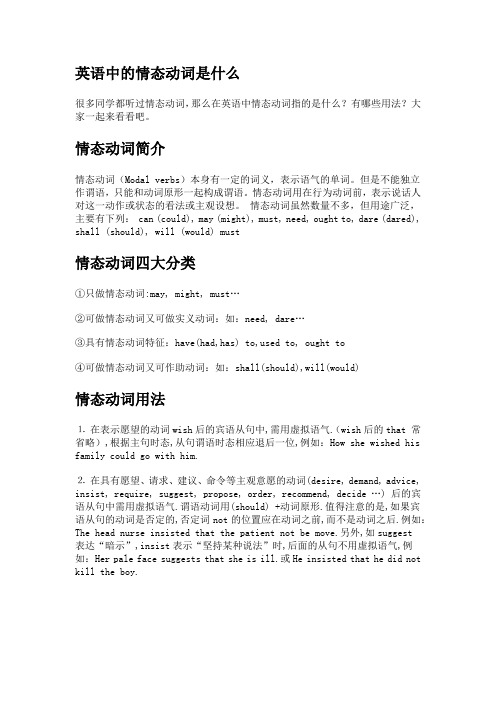
英语中的情态动词是什么很多同学都听过情态动词,那么在英语中情态动词指的是什么?有哪些用法?大家一起来看看吧。
情态动词简介情态动词(Modal verbs)本身有一定的词义,表示语气的单词。
但是不能独立作谓语,只能和动词原形一起构成谓语。
情态动词用在行为动词前,表示说话人对这一动作或状态的看法或主观设想。
情态动词虽然数量不多,但用途广泛,主要有下列: can (could), may (might), must, need, ought to, dare (dared), shall (should), will (would) must情态动词四大分类①只做情态动词:may, might, must…②可做情态动词又可做实义动词:如:need, dare…③具有情态动词特征:have(had,has) to,used to, ought to④可做情态动词又可作助动词:如:shall(should),will(would)情态动词用法⒈ 在表示愿望的动词wish后的宾语从句中,需用虚拟语气.(wish后的that 常省略),根据主句时态,从句谓语时态相应退后一位,例如:How she wished his family could go with him.⒉ 在具有愿望、请求、建议、命令等主观意愿的动词(desire, demand, advice, insist, require, suggest, propose, order, recommend, decide …) 后的宾语从句中需用虚拟语气.谓语动词用(should) +动词原形.值得注意的是,如果宾语从句的动词是否定的,否定词not的位置应在动词之前,而不是动词之后.例如:The head nurse insisted that the patient not be move.另外,如suggest表达“暗示”,insist表示“坚持某种说法”时,后面的从句不用虚拟语气,例如:Her pale face suggests that she is ill.或He insisted that he did not kill the boy.。
情态动词(Modal Verbs)
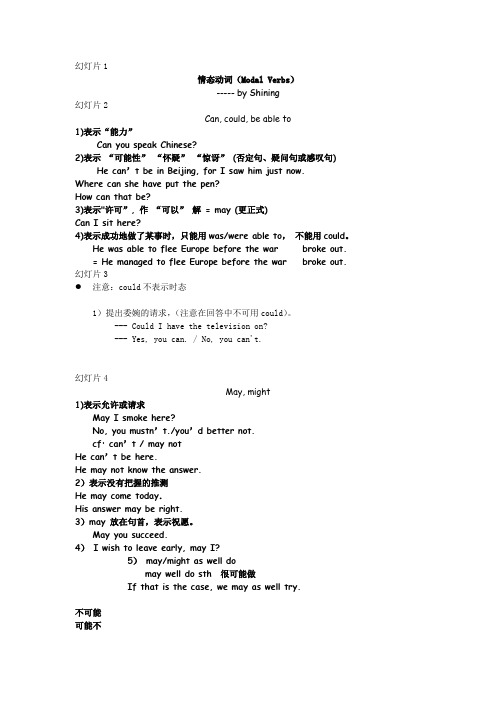
情态动词(M o d a l V e r b s)-----b y S h i n i n g幻灯片2Can, could, be able to1)表示“能力”Can you speak Chinese?2)表示“可能性”“怀疑”“惊讶” (否定句、疑问句或感叹句)He can’t be in Beijing, for I saw him just now. Where can she have put the pen?How can that be?3)表示"许可”, 作“可以”解 = may (更正式)Can I sit here?4)表示成功地做了某事时,只能用was/were able to,不能用could。
He was able to flee Europe before the war broke out.= He managed to flee Europe before the war broke out. 幻灯片3注意:could不表示时态1)提出委婉的请求,(注意在回答中不可用could)。
--- Could I have the television on?--- Yes, you can. / No, you can't.幻灯片4May, might1)表示允许或请求May I smoke here?No, you mustn’t./you’d better not.cf: can’t / may notHe can’t be here.He may not know the answer.2)表示没有把握的推测He may come today.His answer may be right.3)may 放在句首,表示祝愿。
May you succeed.4) I wish to leave early, may I?5) may/might as well domay well do sth 很可能做If that is the case, we may as well try.不可能可能不Must, have to●“必须”(义务、命令、必要)●否定式 must not (mustn’t) 表示“不许可”、“不准”、“禁止”等● You mustn’t smoke here.●Must we clean the classroom now?● No, you needn’t./ don’t have to.●2) “一定”(推测)●must be / be doing / have done●He must be an honest man.●He must be working in his office. 他一定在办公室工作呢。
情态动词modelverb

我可以看一下你的新设计吗? 当然可以。
完整版pt
9
2. may / might
may / might可以表示“许可”“可能性”“祝愿”
1) 表示许可时,may和might没有时间之分,只是 might比may更加委婉,更没有把握。
May / Might I trouble you to pass me the book? 能不能麻烦你把那本书递给我?
( It can’t be Mum. She is at work now.) 那肯定不是妈妈,她现在正在上班。
完整版pt
14
You ____be tired---you’ve only been working for an hour.
A. must not B.C. can’t
B. won’t D. may not
完整版pt
15
3)在疑问句中must可用来征询对方的愿望, 表示“偏要、偏偏”。
Why must you find another job while you have got one? 你已有一份工作,为什么偏偏再找一份?
John, look at the time. _____ you play the piano at such a late hour?
完整版pt
4
The biggest problem for most plants, which ________ just get up and run away when threatened, is that animals like to eat them.
- 1、下载文档前请自行甄别文档内容的完整性,平台不提供额外的编辑、内容补充、找答案等附加服务。
- 2、"仅部分预览"的文档,不可在线预览部分如存在完整性等问题,可反馈申请退款(可完整预览的文档不适用该条件!)。
- 3、如文档侵犯您的权益,请联系客服反馈,我们会尽快为您处理(人工客服工作时间:9:00-18:30)。
1 That can’t be Mary, she is in hospital now. 2 Someone is knocking at the door, who can it be? 3 He said the news could be true. 4 I suppose you could be right. 5 Her coat is here, she can’t have left. 6 I could have arrived on time, but I was stuck in a traffic jam. 7 He can be very stubborn. 8 Winter can be cold in Scotland. 9 I can’t pay now, can you wait till tomorrow? 10 I could ride the bicycle at a very young age. 11You can’t park here. 12 Can/Could you show me the way? 13 How can you be so careless? 14 Can this be true?
Can/could的用法
一 表推测,可能性 can用于否定句与疑问句中 can’t 表不可能 1 那不可能是玛丽,她现在在住院。 2 有人在敲门,那会是谁呢? could 表过去和现在的推测,语气比can委婉 1 他说消息可能是真的。 2 我猜想你可能是对的。 can/could have done 用于否定和疑问句 can/couldn’t have done“过去不可能做了某事” 她的外套还在这里,他不可能已经离开了。 could have done还可表示“本可以做而没有做” 我本可以准时到的,but I was stuck in a traffic jam.
二 偶尔发生的事情,“有时侯可能会” 1 他有时可能会很固执。 2 苏格兰冬天有时会很冷。 三 表能力 can表一般性或将来的能力 could表过去的能力 1 我今天不能支付,你能等到明天吗? 2 我很小就会骑自行车。 四 表许可,请求,相当于may 1 你不可以在这里停车。 2 您能给给我指指路吗? 五 表惊异、疑惑 用于疑问句与否定句中 1 你怎么能这么粗心呢? 2 这是真的吗?
should/ought to用法
三 用于虚拟语气 1 假如给我三天光明,我应该珍惜。 2 如果过去我努力学习了,我就可以过上更好的生活了。 3 如果我当班长,我就应该努力工作。 4他请求/建议/要求/命令/坚持我跟他走。 例句欣赏 1 You should be to blame for the accident. 2 We should care for the old and young. 3 The Spring Festival this year should fall on February. 4 They should arrive Beijing by Friday. 5 The flowers are dead, we should have watered them. 6 We should have beaten them. 7 How should you speak to me like this. 8 I can’t believe he should cheat in the exam.
9 If I had three days to see, I should value them. 10 If I had studied hard, I should have lived a better life. 11 If I were to be the monitor/ Were I to be the monitor, I should work hard. If I should be the monitor/ Should I be the monitor, I should work hard. 12 He requested/suggested/advised/required/ ordered/insisted that I (should) to with him.
must用法
must用法
三 表示“偏要,偏偏",说话者埋怨、不满 的 语气。 1 如果你非要吸烟,请出去。 2 你非要晚上这么晚给我打电话吗? 3 Just as I sitting down for lunch,________(偏偏电话铃响了). 四 反义疑问句的用法
பைடு நூலகம்
例句阅读 1 You must give up smoking. 2 You must hand in your homework by Friday. 3 You mustn't make phone calls while driving. 4 She is wearing a long face,she must be angry. 5 It must have rained last night,for the road is wet. 6 He is in high spirits, he must have passed the exam. 7 If you must smoke, please go outside. 8 Must you phone me so late at night? 9 Just as I sitting down for lunch, the phone must ring.
情态动词 Model Verbs
一 必要性 must do 现在或将来“必须做某事” mustn't do 禁止、不许做某事 1 你必须戒烟。 2 你们必须周五前上交作业。 3 开车时你不许打电话。 对must问句的回答 ——Must I finish it now? ——Yes, you must. ——No, you needn’t./ you don’t have to. 二 表推测、可能性 肯定的推测,“一定是、准是” ,只用于肯定句 must have done 对过去的肯定的推测 1 She is wearing a long face,_____。(她一定生气了) 2 (昨天肯定下雨了)_________,for the road is wet. 3 He is in high spirits,________(他肯定通过考试了).
六can/could 的习惯用法 1 can’t /couldn’t but “只好做” 我们只好等到他来。 2 can’t help doing“忍不住做” “不可避免做” 他忍不住笑起来。 While learning English,__.我们免不了要犯错误。 3 can’t help but do“忍不住做” 我忍不住想家。 4 can’t wait to do “迫不及待做” 我迫不及待地要进行一次自行车旅行。 5 can’t/couldn’t +比较级=最高级 再好不过了。 6 can’t/couldn’t + too, too much, enough“再……也不为过” While driving,________.(你在小心也不为过) 我对你感激不尽。 七 could用于虚拟语气中 1我希望我会飞。 2如果我有一张地图,我就可以找到路了。 3如果我努力学习,我就可以赢得奖学金了。 4如果我当班长,我就可以交更多朋友。
15 We can’t but wait till he comes. 16 I can’t help laughing. 17 While learning English, we can’t help making mistakes. 18 I can’t help but think of my family. 19 I can’t wait to take a bike trip. 20 It couldn’t be better. 21While driving, you can’t be too careful. 22 I can’t thank you too much. 23 I wish I could fly. 24 If I had a map, I could find the way. 25 If I had studied hard, I could have won the scholarship. 26 If I should be the monitor, I could make more friends. Should I be the monitor, I could make more friends.
例句阅读 1He told me that he may/might be late. 2 He might/may come tomorrow,but I am not sure. 3 It's late,I think he might/may have gone to bed. 4 He may/might not have finished his homework. 5 It was so dangerous, we might have been killed. 6 You may come if you want. 7 ----May/Might I come in? ----Yes, you may. 8 May you be happy. May you enjoy yourself/have a good time. May God be with you. 9 He may well win. 10 He may well turn down your invitation. 11 You may/might as well study hard while you are young. 12 You may/might as well finish your home work on time.
